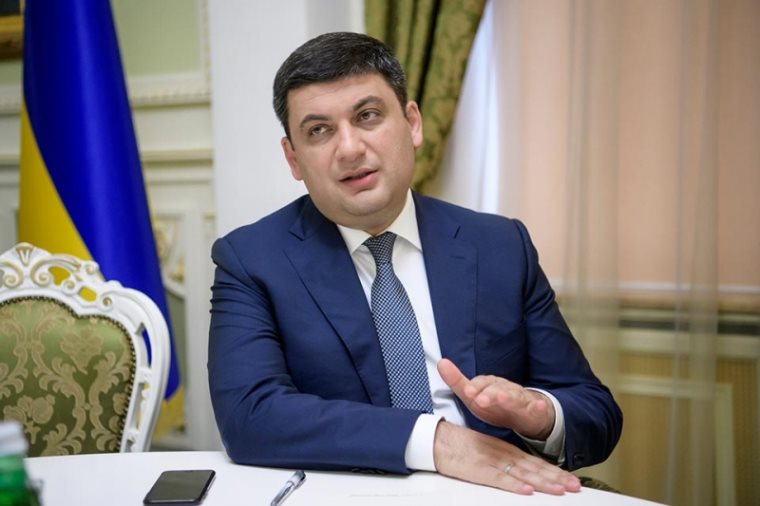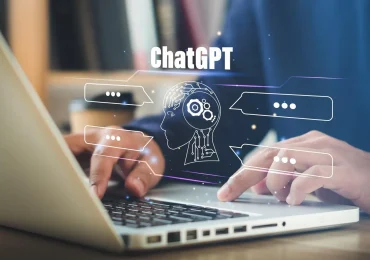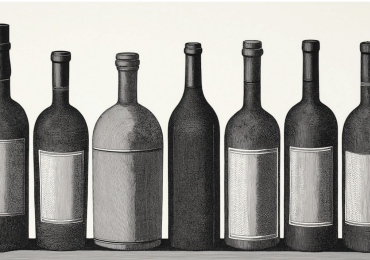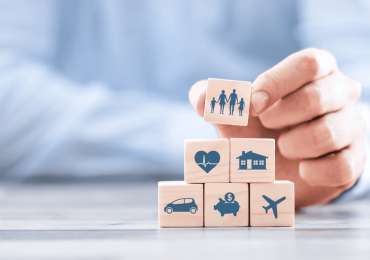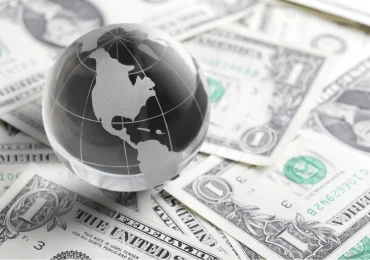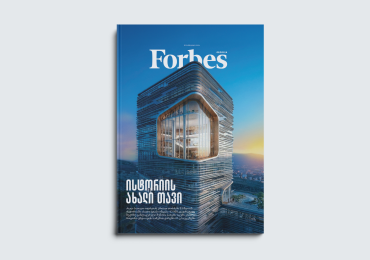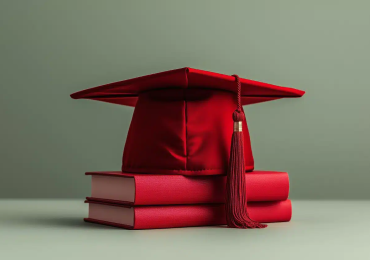The Prime Minister of Ukraine is only three years younger than me. During the fifty-minute interview, he spoke particularly passionately about his eight-year tenure as the mayor of Vinnytsia. Throughout the interview, Volodymyr Groysman – one of the most prominent Prime Ministers of the country – tried to convince me that Ukraine is not a failed state. Let’s see if he managed to do that
You look tired …
Not at all. Being tired is not my style.
You arrived only yesterday. We have already seen the protocol meetings that were held today. The Prime Minister already calls you his friend.
This is a great honor for me. I have much respect for him. In addition to the fact thathe is a very good manager, he is also a very good person in my opinion.
Have you known Giorgi Kvirikashvili for long?
Not really, only for about a year. We’ve been friends since our first meeting and that’s why I think it is a great honor for me to call him my friend.
I will certainly ask our prime minister about you. But before that, I would like to know what it means to be the prime minister of one of the largest countries in Europe and the entire continent?
There are two issues. But firstly, one should realize that this is God’s Will.
God’s Will?
Yes, it was God’s will for me to be in that particular place and at that particular time. If you look at my biography, you will see that I assumed responsibility for a big city with a population of 400,000 people at the age of 28. I was twice elected as mayor and was in the service of the city of Vinnytsia for eight years. The city had a lot of problems. So when I’m asked what it means to be the prime minister of a large country, there are two important things that need to be underlined: being a prime minister is a huge responsibility and at the same time, it is a big opportunity to change the country for the better.
And it’sprobablya big challenge too, isn’t it?
Needless to say it’s a big challenge as well. Any position of power comes with leverage and this leverage can be used in different ways. Some may put it to good use and others may abuse it. I am the kind of person that strives to create something, and I want Ukraine to take the position that it deserves to have – I want it to become a state with strong democracy and a strong economy. I believe that we must put an end to this decade of missed opportunities.
In 2004, when Leonid Kuchma resigned and Victor Yushchenko took over the country’s presidency, the economic growth rate was at 11%. If the structural reforms had been carried out properly and the economic growth had been enhanced, we would have colossal economic growth. The population of the country would have felt this growth. However, it did not happen. Yushchenko retained power for only nine months, and then he became powerless. Especially from the economic point of view. At the same time, the government failed to achievethe effective transformation of reforms. The economy of Ukraine has been weakening with each passing year since 2004. Corruption has grown and eventually we witnessed the Russia invasion in 2014.
Was the 11% economic growth in Kuchma’s formation due to his policies or do you attribute that to the transitional period?
When Kuchma was about to leave his position, the economic growth indicator was over 10%.
It is an interesting coincidence. The economic growth rate in Georgia was also at 11% in 2003. However, this did not stop the Rose Revolution…
Perhaps it was a common trend at the time and we should have seized the opportunity and built on it. One can catch the tide and start to enlarge or just swim along following inertia to where it takes us. I think that we chose the second option. We gripped the tide and crawled following this inertia. Consequently, we faced one crisis after another as the economy of Ukraine weakened and shrank.
So what did you seize on? The western press has christened you as the ‘Jewish wunderkind’. Maybe these tags and epithets are associated with your eight-year tenure as the Mayor of Vinnytsia?
As for my biography and public life in the capacity of mayor and MP (by the way I was only 24 at the time), I told my voters that they would not feel embarrassed by my work. I promised to serve them faithfully and honestly. Of course, the assessments I received were diverse. Some gave me positive appraisal, some criticized me, but most importantly, six years into my tenure I earned the trust of the people. We also managed to form the majority and a very tight team. Eventually we moved the city up to the leading position all the way from the bottom.
This is the story of my, or rather our mutual success. We must do the same with regard to our country. We must change the quality of life among the people. The majority of the population is very poor. There is a lot of mistrust among the public and we must give them back hope for a better, peaceful future. We must make our country stronger and strengthen its potential. I want the Ukrainian people to lead a better life, and this is not simply a slogan. I want to improve the education system, our healthcare and the environment. I want to fix the roads. I want Ukraine to have energy independence, to increase legal income and create more jobs. All of this is achievable. Most importantly, we deserve it, we can do it and we will certainly achieve it.
Mr. Prime Minister, I would like to …
I want to share with you one story, Giorgi. This story is from the series of ‘the decade of missed opportunities’. At that time and even before that, everyone was talking about how expensive or cheap the gas that Ukraine was buying from Russia was. Discussions about this rhetorical topic were endless. In fact, the main question is not about what price we pay for natural gas, but rather when will we quit buying gas from Russia? Why? Because, the Ukrainian gas reserves are enough to supply the entire country with natural gas and even export it abroad. Yes, this is an entirely different model of economic and energy independence. This is how we should approach this problem. Especially now, given the fact that we spend over 5% of total GDP on defence, we absolutely need to focus on energy-security and energy-independence. We have launched large-scale infrastructural projects (construction) in order to tackle this problem.
Do you think it is working?
Yes, it’s working. As a matter of fact, I never give promises that I cannot fulfil or ones that I do not intend to fulfil. When I say something, it means that I am seriously considering doing it and I want to change something. We said that we would build a road and we are indeed in the process of building a new road. The quality and volume of the work increases with every year. We are reconstructing, building and fixing roads, but one question keeps nagging me: there was no war before 2014. Why weren’t we building roads at that time?
They were probably stealing…
Are you asking where the money was going? The problem was a lack of professionalism, total corruption of the government and caring only for personal well-being. This was weakening Ukraine, and I want Ukraine to be a strong country.
And corruption remains to be your main challenge?
You know what, let’s assess the situation objectively. I won’t deny that there were certain spheres where corruption was thriving. However, the list of spheres that were awash with corruption is obviously shrinking now. Approximately 10 billion Dollars was spent every year on state procurements carried out through very suspicious schemes. We have put into operation one entirely transparent system, which I believe is one of the best in Europe. We have completely eradicated the corruption factor from online procurements. The electronic procurement system that is in place now does not provide a chance for the corrupt officials who used to pocket billions of dollars in the past. Besides, all state funds are now concentrated in the budget only. Earlier, all financial resources were gathered in one single budget. In other words, all resources were centralized. This led to corruption and often times, the people who managed these resources took bribes.
We managed to decentralize finances and allotted approximately $4 billion among the local budgets. In fact, we eradicated the monopoly, which was so often abused. For instance, we revoked the natural gas pricing scheme. Our country had always had two different prices for natural gas: the state rate was at 2,000 UAH and the commercial rate for gas was 7,000. A lot of corruption money was made through this discrepancy. Today the price is equal and any chance of corruption in this sphere has been eradicated. As far as the healthcare sphere is concerned, we used to spend approximately 200 million annually on the procurement of medications. Now we buy medications with the help of international organizations and we have completely eliminated any chance of corruption in this sphere as well. The list of spheres where corruption has been eradicated is growing larger and larger.
Mr. Prime Minister, are you actually trying to say that you have managed to eradicate corruption in Ukraine?
Where else do we still have corruption? Obviously, there is still corruption in the law enforcement agencies, the courts, the license and permit-issuing agencies and the state agencies providing various services. Therefore, it is of the utmost importance to ensure successful privatization. Within the framework of the ongoing reforms, this past autumn we passed the necessary legislation on privatization. This means that there will be some sort of transparent system in place.
As you mentioned yourself, there is still corruption within law enforcement agencies. Don’t you think that this explains why corruption remains the number one problem in Ukraine?
I will be absolutely honest with you, without sugar-coating things. I believe that a lot of our enemies are interested in destabilizing Ukraine and they always put forward the issue of corruption in our country. They constantly reiterate that corruption is widespread. And they do it everywhere, including abroad. I come across this issue from time to time and I believe that it is exaggerated.
In other words, this is black PR against the country? Is that what you are saying?
I believe that this information is presented in the most negative way to make Ukraine, along with its population of 40 million people, look bad. Of course, I don’t encourage sweeping problems under the rug. On the contrary, I think we should face these problems. I appreciate when someone points out the problems to me, if there are any.
That is what we are here for…
If and when I see a problem, I start thinking about ways to solve it. If I am not aware of them, I will never be able to solve the problems that are bothering our population. That is why we initiated electronic tax statements. This was a step forward in our fight against corruption. We have made all registries accessible for the beneficiaries. Information as to who owns what company is currently accessible to the general public. In terms of openness (transparency), we hold a leading position. We delivered a blow to the representative government.
How does all this reflect in the ratings published by the World Bank and Transparency International? As far as I know, you are working in this direction as well?
We are gradually moving forward in this direction. We are in the middle of a transformation. We have moved from a 17% economic fall, to 2-3% growth. This is a major transformation. We have completed a certain stage of the transformation, maybe the population cannot feel it yet, but the first impulses are already emerging.
I will illustrate a few examples: total reform of the public service. We launched the reforms process on May 1st, 2015. As of January 1st, 2015 we began the global decentralization of the government and the distribution of resources on the local level. On August 1st, 2016, we launched a total reform of the procurements system. We created anti-corruption infrastructure and institutions. Despite the fact that our anti-corruption efforts are perceived in different ways, we still have agencies that are engaged in identifying, preventing and investigating cases of corruption. This is a sovereign agency, which is run by hand-picked, independent management with high legitimacy.
But these people were still selected by the government.
Yes, they were appointed by the government, but they had to go through a very tough selection process. Time will show whether this is good or bad. But these institutions have already been created and they are about to implement their institutional obligations. We have passed the toughest possible legislation and imposed very rigid requirements for government officials. We are in the process of building a new court system and we have recently completed work on the formation of the Supreme Court. So is it good or bad? I believe it’s good. How will they cope with their obligations? It’s too early to make such predictions, since we have appointed new judges. I want them to handle cases fairly and independently. When we have a distinct and fair supreme court in the country, this will send an entirely different signal to the lower courts. We have also passed new legislation pertaining to education and reformed the healthcare sector by passing new legislation. In October of this year, we implemented reforms in the old-age pension sphere. This is an entirely new reform that will have a significant impact on microeconomic stability and social equality. We have taken major steps towards ensuring the energy independence of Ukraine. We are also taking the first steps to reform privatization. The seven laws that were in place to regulate privatization will be replaced by one single law on privatization.
Does that mean that you will have total privatization in Ukraine? Currently there are approximately 3,000 businesses that are under state ownership.
With the exception of several dozen businesses that have strategic importance for the state, everything else will be privatized. By strategically important fields I mean – railway, air navigation, energy carriers, atomic energy production and so on. So it is not correct to say that Ukraine is not moving forward. Ukraine will be successful!
We are experiencing a difficult time right now, but what else should we expect in a country that has not implemented any structural reforms for over two decades? Until now, we lived on post-Soviet economic remnants – that was all we had. Of course, we need to mention the presidency of Kuchma as well. The period of economic revival started during the presidency of Kuchma, when the constitution was passed. Needless to say that there were problems then too, but he managed to overcome the rising crime rate in the late 90s. Later there was the emergence of some political movements that demanded the resignation of Kuchma. His presidency was followed by a decade of lost opportunities, when we failed to build democracy in the country. However, this time we should not miss the opportunity to develop our state,and I think this is a very honorable and ambitious goal that needs to be shared by everyone.
I am not going to lie and tell you that it’s easy for me to discuss economic parameters or business with you. You are the prime minister of a country that is actually in the middle of a war with Russia and these hostilities are ongoing as we speak. On the other hand, the statistics are rather gloomy and so is Ukraine’s foreign debt, which is almost 81% at the moment.
Ukraine’s foreign debt is 83% to be more precise.
Thank you. But this means that every citizen of Ukraine owes approximately $1,800-1,900.
To be fair, in 2014 when Arseniy Yatsenyuk became the prime minister of Ukraine, the state budget was $10,000 (in February 2014 there was 108 000 UAH on Treasury’s account).
Do you mean there was only $10,000 in the treasury? In other words, they had stolen all the money?
It was a total robbery. The previous regime brought colossal damage to the country. This was followed by the annexation of Crimea and the invasion into the east of Ukraine. All of this taken together was an unprecedented challenge for us – and you are right about this. However, in order to win, you have to be strong, and since we mentioned this, we need to give credit and show our utmost respect for those Ukrainian soldiers that are holding back the enemy. We have a very strong army. And while they are fighting with all their might for the territorial integrity of Ukraine, we are obliged to do what we can in order to ensure the success of our country. In fact, our enemy wants us to be busy with everything else except for the development of our country.
So the enemy wants Ukraine to …
The enemy wants Ukraine to stop existing.
So the enemy wants Ukraine to be a failed state, is that right?
Yes, that’s right, and they encourage the ideology that ….
In other words, this is PR too?
This is not only PR. This is also fear. They realize that Ukraine will undoubtedly make it and become a successful state. They feel it, they can see that a lot of undertakings we have embarked on are done in the right way. That is why they want to mislead the rest of the world about Ukraine being totally swept by corruption. They want the world to think that things are not going well in Ukraine, that it won’t be able to make it, that Ukraine is not a state and so on. Absolutely no! This is over. Ukraine is a state!
No, it’s not over yet. We are continuing with this interview …
And Ukraine will make it! No matter how difficult this road is, the process is irreversible and now it’s only a matter of time before we see the results. Besides, we are not the aggressors; we have not intruded into anyone’s territory. Unfortunately, yes unfortunately, we were invaded by Russia. It was not our doing. It is their doing and by their actions they have wiped out everything there was. They still continue to shoot. They are killing people that they once called their comrades. This is a disaster, but we will still make it. We will be strong and our army will be modernized. Our country will be modern and people will live better. Obviously, it will take some time before our hard work starts yielding results. But we realize that we have very difficult challenges to overcome before we reach that point.
You were twice elected as the mayor and have eight years of experience. Do you think, Mr Prime Minister, that you still have eight years to accomplish that mission, can it wait that long?
God only knows how much time we have for that.
Even God needs help sometimes …
I want this to happen as soon as possible.
I know. I can feel how much you want it. I read about this before meeting you. At the same time, I want to see stability in your country. Based on your personality and your cabinet of ministers, I hope you have enough time to accomplish what you strive for. And still, I would like to know how you managed to make Vinnytsia attractive for Oligarchs while you were the mayor of that city? They were happily putting investments in the city.Can you tell me how you managed that?
I don’t think it was attractive for oligarchs.
Ok, I will rephrase it. How did you make this city attractive for businessmen?
Just a few weeks ago, an international rating was published (I don’t remember the name) and Vinnytsia was named as one of the most attractive investment destinations. Usually, I am very neutral to ratings… I know that if new plants are being built, it is undoubtedly a good thing. When I was first elected as mayor at the age of 28, I did not know how much time I had. No one knows how much time they have. That is why it’s so important to dedicate yourself completely to your work every single day. One more important detail: I never talk in vain. I want to achieve fundamental reforms and never resort to superficial or PR decisions. I never make up or tell stories to the population. Maybe for short-term perspectives this is an effective strategy, but this is not how I approach things.
Is the Georgian model of fighting corruption applicable for you?
I think that there are different experiences and practices that need to be applied. You can find positive and negative sides to everything. For instance, in 2008, we established the Houses of Justice just like you have in Georgia. They were created to ensure the delivery of transparent services to the population and they still serve this purpose: starting with the registration of marriages and the registration of vehicles. The Houses of Justice in Vinnytsia have provided services for registering old-age pensions and businesses for eight years now. This means that we could have found a way out even in the old system. Georgia has indeed achieved a lot in this direction. The whole purpose of this is to fight against corruption. Now we need the third element. The first element is legislation, the second element is anti-corruption agencies and now we need a fair court system. I must eradicate all possible shortcomings that may be used as sources of corruption. I cannot do this by myself. This requires a consolidated position among the parliament, president, the majority and other political factions that have faith in the future of our country. It is not easy to work together, but we still manage to make important decisions. For instance, a lot was accomplished during the tenure of the previous prime minister. We always had a tradition in Ukraine to sling mud at the predecessors, but I believe we should forget this tradition and call everything its name. Everyone makes mistakes and Yatsenyuk made his share of mistakes. I will make my share of mistakes. He made a lot of unpopular decisions, which enabled him to stabilize the situation. My tenure as the prime minister also coincided with unpopular times in the history of Ukraine and therefore I have to make some unpopular decisions as well. In spite of that, I managed to achieve the current economic growth rate. I don’t think that this is only my achievement; we managed to do that as a result of our teamwork.
I don’t know if you share this opinion, but there were some lost years in the relations between Ukraine and Georgia. What is your vision of close cooperation between these two countries in the future?
I don’t want to look back. It is hard for me to judge whether there was any gap in these relations. I don’t think there was any. However, I think that today we have very close, friendly relations. As we are recording this interview in Tbilisi, there is a Georgian film festival being held in Kiev. We have very good cultural relations. We can do a lot for the economies of our countries through this close cooperation. The volume of trade between Georgia and Ukraine is $500 million.
But still, you and your Georgian colleague see a lot of potential in these relations and we still manage to miss the opportunity to use this potential.
We are not missing any chances. We are beginning to develop.
Can we call it a reboot in the relations between the two countries?
If that is more comfortable for you, we can call it a reboot. We have very good relations. Our journalists held a survey in the streets of Tbilisi yesterday and the day before. They wanted to learn what the population thinks of Ukraine. You can find that survey on my Facebook page. The general attitude of the population is very sincere and friendly. If you ask people in Kiev, Lvov and Vinnytsia what they think about Georgians, you will see that they speak with a lot of warmth and love about your people. I think that this is the foundation of good relations between our countries. The Silk Road Forum is launching tomorrow. We have agreed to set a date for when we can start working on building the necessary logistics together: Azerbaijan, Georgia and Ukraine. We will work jointly on this project. I am highly motivated to enhance this partnership.
“Unfortunately, yes unfortunately, we were invaded by Russia. It was not our doing. It is their doing. By these actions, Russia has erased everything they could possibly erase. They are still shooting at us!”
What do we need to do in the economic and business spheres to further deepen our partnership?
There are many, the agricultural sphere is one of them. It is one of the priority spheres and so is the military-technical sphere. We can produce for third world countries together….
You are the first Prime Minister of Ukraine to visit Georgia after the so-called ‘pause’ in relations between our countries. This was the first visit since we were under the impression that the strategic relations between our countries were only on paper.
I met with Prime Minister Giorgi Kvirikashvili about a year ago and we agreed that I would visit Georgia. It was a very obvious decision for me. The President’s visit, that preceded my arrival, also served the purpose of enhancing cooperation between our countries. I don’t want to think that there are any signs of estrangement in the relations between Georgia and Ukraine.
I understand that. But don’t you agree that there was a ‘pause’ in relations? First there was the visit of President Poroshenko and then your visit. But what about before these visits? Was the Saakashvili factor an issue then?
There is no such thing as the Saakashvili factor.
Are you saying there is no such factor?
Yes, I think that there is no such factor.
Are you saying that there never was such a factor?
It is my personal opinion that there is not a single person that can influence relations between the two countries. On the one hand, I completely exclude this possibility and on the other hand, I met with Prime Minister Kvirikashvili six months after my appointment as the Prime Minister of Ukraine. I have held this position for a year and a half now. We have had a very good relationship since our first meeting.
Somehow, I cannot recall your predecessor. Please, don’t take it personally. The fact is, Groysman is in Tbilisi now.
As for Yatsenyuk, he was participating in the meeting that was held within the framework of the GUAM Summit. We had a very productive meeting at the time and I don’t see any complications in that.
Are there any issues that could possibly hinder the development of relations between the two countries? Do you see any such issues?
No, I don’t see any issues that could possibly hinder the development of relations between our countries. We are in the dialogue regime right now and when there are issued to be resolved, we’ll do it jointly.
What is your view about the deportation of dozens of Georgians from Ukraine, which is actually assessed as a political decision? If you were the Prime Minister of Georgia, how would you assess this move?
Our country has law-enforcement agencies that act in accordance with the law and if anyone violates these laws, these agencies respond accordingly. They act in compliance with the law even if their actions might be taken as politically motivated. Let me tell you this, all law-abiding citizens of Georgia are treated with respect and love in Ukraine. I am confident that all law-abiding citizens of Ukraine are similarly respected in Georgia. However, if a citizen of Ukraine takes the liberty to violate Georgian law, they will be immediately deported and we will treat this decision with respect since it is the sovereign right of Georgia to do so.
We have one citizen of Ukraine that fits that description. He is suspected of engaging in activities that are in violation of Georgian law, but he has fled Ukraine and now lives in Georgia. I am talking about Leonid Chernovetskyi, your colleague – the former mayor of Kiev. Forbes estimated his property at $500-800 million. He is far from being poor. Do you have information if the law enforcement agencies of Ukraine have any charges against him?
I am in the executive branch of the government and lead cabinet of ministers. So far, I have not heard any complaints from the minister against Mr. Chernovetskyi. As for the law enforcement services, as far as I know, from time-to-time they have some questions concerning Mr. Chernovetskyi. This issue is outside my competence and I cannot really discuss it. I have heard of certain issues pertaining to this person, but it would be better if you asked the law enforcement services to provide an assessment of the situation regarding Mr. Chernovetskyi.
Is the need for the International Monetary Fund (IMF) program a top priority for Ukraine? Ukraine is not an exception and the price for that is always very high. Are there any unachievable demands that were made for Ukraine? The IMF speaks about oligarchs, shortcomings in the banking system and other problems in its reports.
We have a very good cooperation with the IMF in the sphere of governance. Most of their recommendations currently are in the sphere of anti-corruption, which is generally outside the competence of the government. These recommendations mostly have to do with the establishment of the relevant institutions. However, we fully support the establishment of anti-corruption courts. I believe that this is the right move. When there is a crime committed, there must be an adequate punishment for that. Once we have that in place, everything will work as it should.
As for the banking system, the National Bank of Ukraine is an independent regulator of the banking system. As far as I know, the International Monetary Fund is satisfied with the work of the National Bank of Ukraine. As regards the government, the reforms we are implementing are more important for Ukraine and its population than the international organizations.
[The Prime Minister is obviously drawing the conversation to an end, which is completely understandable, since he is scheduled to meet with his colleagues – members of the cabinet of minister of Georgia for dinner in a few minutes.]
I will finish this interview with the same words that I began it with: I believe in the successful future of Ukraine. I believe that Ukraine will be a strong, democratic state with a dynamically developing economy. I want this to influence the quality of the daily life of the population of Ukraine. This requires good decision making, retaining political leadership and the desire to leave behind a good legacy. I believe that when a person is sincere in his desires and decisions, everything is possible.

